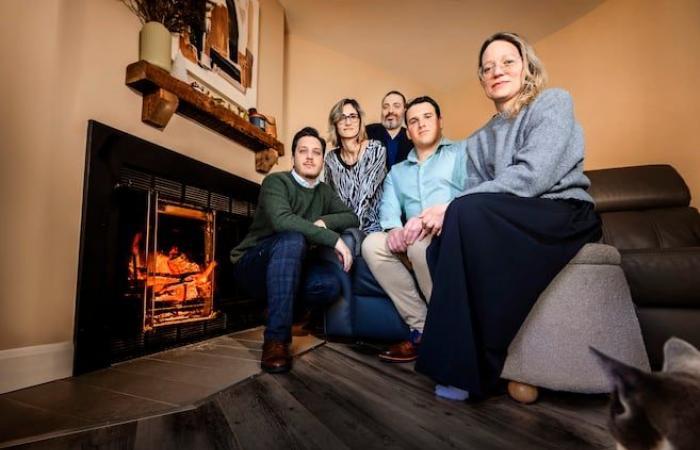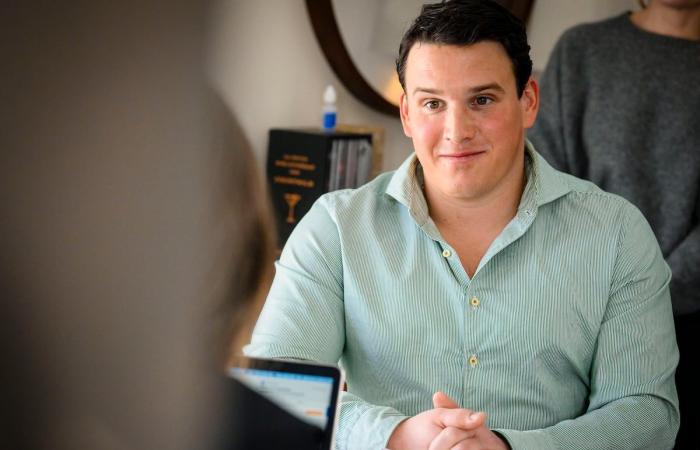Alexandre Lemay, Sonia Joannette and the couple Abir Taha and Ziad Salloum live in three different sectors of Quebec.
The first, a young 30-year-old professional, has a condo in Charlesbourg, equipped with an atmospheric fireplace.
The second lives in a house in Lebourgneuf, which has neither stove nor wood fireplace. She would like to acquire a device, but the municipal regulations of Quebec City, tightened in 2023, complicate her life, she says.
Then, the last are parents who own a house in Val-Bélair, in which they had a wood stove installed barely two years ago. An “anti-stress” in the event of a power outage, the couple shares.
Although their situation sets them apart, all four have one thing in common: they struggle to understand the Regulation on solid fuel appliances imposed by the City of Quebec which controls the installation and use of wood heating appliances.
Even more, they consider it “excessive”. So much so, that they sent together, on Monday, a formal notice to the City of Quebec, signed by the hand of their lawyer, Me Samuel Samson.
“This excessive regulation is, in my opinion, unconstitutional because it infringes on the right to energy,” summarizes in an interview with Soleil the lawyer specializing in energy law.
The clients of lawyer Me Samuel Samson, Sonia Joannette, Alexandre Lemay, Abir Taha and Ziad Salloum, consider the Regulation on solid fuel appliances of the City of Quebec “excessive”.
(Jocelyn Riendeau/The Sun)
At the end of 2023, the Marchand administration tightened the screws on wood heating on its territory.
Since January 1, Quebec has banned the installation of new decorative or ambient wood-burning fireplaces. In September 2030, it will simply become impossible to use them. As planned, the City is keeping fall 2026 as the target date for banning non-certified wood stoves.
The new restrictions triggered the anger last winter of an entire industry which feared being branded. But with public health as a “priority”, Mayor Bruno Marchand’s team showed its colors by refusing to back down on the proposed changes.
“Fundamental right”
However, these provisions “irremediably undermine the fundamental right to energy”, argues Me Samson in his legal action.
He is of the opinion that the reasons given by the City and the regulations put in place are “largely exaggerated” and “not justifiable from the point of view of the overall quality of the environment”. The lawyer argues that the majority of fine particle emissions emitted into the air by human activities in Quebec do not come from wood.
“While it would be really easy to be less excessive and more measured, the City, and the mayor in particular, seem to have their blinders closed to demonstrate reasonableness,” he alleges.
“We have a municipal administration which, on the one hand, tells us that we must save the planet and that the Earth cannot wait, but which, on the other hand, goes on a crusade against an efficient energy source , ecological and local.”
— Me Samuel Samson, lawyer specializing in energy law
Me Samson’s clients are calling on Quebec to modify its regulations “in a way that would be acceptable and which would not excessively infringe on the right to access energy,” explains their lawyer.
“We are not against virtue, but on the other hand, we often say that hell is paved with good intentions. Where we say that the regulation is not proportional is that there would be a way, in our opinion, to achieve the same ends which are sought by the regulation without going so far,” he submits.
The lawyer specializing in energy law Me Samuel Samson
(Jocelyn Riendeau/The Sun)
The use of the devices could, for example, be suspended on days when the air quality reaches a certain threshold of deterioration in Quebec and when there are no power outages, the lawyer suggests.
Hydro-Québec “obsolete”
Because breakdowns “are expected to increase”, Me Samson considers the municipal regulation “all the more worrying” in a context where the increase in electricity consumption is subject to “pressure that is struggling to support the distribution network of Hydro-Québec.
For some, he defends, wood heating constitutes an “essential solution” in the event of a breakdown.
“The Hydro-Québec network, in the absence of priority for energy security on the part of governments, has lacked investment and is showing itself to be obsolete. There is an energy transition which is increasing the need for electricity. People need a source of additional heating,” he maintains.
The lawyer believes that the issue could possibly go beyond the borders of Quebec City and that the regulation could be declared “inoperative on the basis of constitutional rights.”
Even further
The formal notice sets February 15 as the deadline by which citizens ask the City to comply.
For the future, they have no fear.
If this is not done, “we will go to court. And if necessary, go to the Supreme Court,” undertakes Me Samuel Samson.
WHAT THEY SAID
“When we looked at the options with the store, we were told: “You know that we don’t know how the City complies with the regulations. It’s not clear. If you spend $25,000, are you going to be allowed to operate on it?” Do we install it the same and then are we illegal? We want to know how to get in line.” — Sonia Joannette
“Why don’t they look for the pulse of the population? They make decisions with disconnected people. I won’t go bankrupt because I have to put $40,000 on a home. We are not here to fight against the City. We are here to make ourselves heard.” — Alexandre Lemay
“Our home is an anti-stress element during the winter. We have the impression that the regulation is motivated by politics and not by ecology. The climate has a hard time these days, but the carbon footprint for wood is zero.” — Abir Taha and Ziad Salloum







